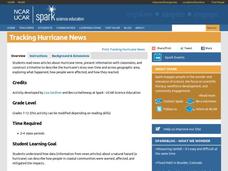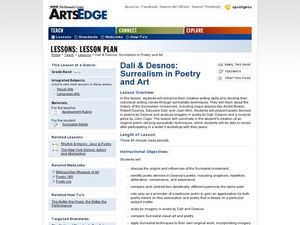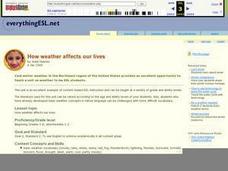Curated OER
Chameleons Are Cool!
Have your learners review what they know about camouflage using this lesson. Learners fill out a graphic organizer listing what they know or have questions about. This could be enhanced with the addition of a writing assignment in which...
Curated OER
Zoo Animal Experts
As part of an exploration of zoo animals, kindergarteners conduct research on their favorite animal and compile their information. Learners write about their animal in a journal and create a trading card. The culminating activity is a...
Curated OER
Connecting the Dots: Workers and Their Importance
Students explore the role of workers and their jobs in the community. They write a friendly letter to a community worker expressing appreciation for the work they do and their importance to the community.
Curated OER
Nervous System
Get to know the body's central nervous system through an engaging game of nervous system telephone. But this isn't your average game of telephone. Here, pupils must find a way to communicate a message to the brain without speaking....
Curated OER
The Number Match Game
Kindergarteners practice matching words and symbols by playing an index card activity. They create flash cards numbered 0 to 20 and challenge each other in groups to identify the values of the numbers. Learners utilize beans or buttons...
Curated OER
Enjoying the Adventure
Students watch the video of "The Prince and the Pauper" and analyze, compare and contrast the characters. They write letters to a character from the point of view of another character and create a new ending to the play.
Curated OER
Gary Paulsen's Canyons, Chapter 9 "The Raid" List-Group-Label
Class members categorize and then label a list of words drawn from "The Raid," chapter nine of Gary Paulsen's Canyons. Individuals explain the rationale for their word groupings.
Curated OER
Muscular and Skeletal Systems
How do muscles move bones? Find out using a built-in-class model. Pupils construct a hand model with paper and string, then follow a series of directions to explore the movement process. Discover additional information about the muscular...
Center Science Education
Tracking Hurricane News
Here is a unique twist for your lesson on hurricanes. After examining extreme weather news headlines, your storm chasers view a PowerPoint about hurricanes and then zoom in on Hurricane Irene. They map a timeline of her trek up the East...
Curated OER
Information Shuffle
Gather some information, print it onto sentence strips, and then have your class physically shuffle the cards to better understand the importance of organizational patterns in writing. Middle school learners examine information for a...
Curated OER
Moby Dick Puppetry
Such an ambitious lesson! Third graders with special needs listen to an audio recording of the novel, Moby Dick. They stop often to discuss each of the main characters and analyze their actions in the story. They then make puppets of one...
Curated OER
"O Captain! My Captain!"
Who was Walt Whitman, and what link does he have to president Abraham Lincoln? After Lincoln's assassination, Whitman wrote "O Captain! My Captain!" This poem and "When Lilacs Last in the Dooryard Bloom'd" are the focus of exercises...
Pennsylvania Department of Education
Freckle Face
Students collect and record data. In this early data analysis lesson, students gather data about their partners face. As a class, the students use tally marks and pictographs to record the data and answer question about the information...
Curated OER
Activity Plan 5-6: Bugs, Bugs, Bugs!
Students become entomologists for a day. In this life science lesson, students go on an insect hunt and investigate insects and their homes. This leads to the creation of an insect by each student. Lesson includes a take-home activity...
Curated OER
Learning about Maps and Colors
First graders discuss "Harold and the Purple Crayon" and his drawings. In this neighborhood geography activity, 1st graders learn to detect and classify places on a map including their home. Students recognize their address as a specific...
Curated OER
Dali & Desnos: Surrealism in Poetry and Art
Students research the surrealism movement and its primary artists. Language is also analyzed, and students will create their own original poem utilizing surrealistic techniques.
Curated OER
Discovering Peace
Students explore vocabulary related to peace. In this peace lesson, students define the word "peace" and create a poem about peace. Students create a "peace quilt" as a follow-up activity.
Curated OER
Primary Sources and Protagonists: A Native American Literature Unit
Introduce your middle schoolers to the lives of past Native Americans. First, learners work together to put photographs in a sequence. Then, using their sequence, they create stories to share with the whole class. No matter how old your...
Curated OER
Creating Comic Strips
Students create comic strips to communicate ideas that cannot be expressed through words alone.
Curated OER
Industrial Revolution
Students cite the importance of the steam engine, cotton gin and steel making process. They describe conditions in cities due to increased industrialization. They explain how the living and working conditions led to the development of...
Curated OER
Harriet Tubman
Students detect specific characteristics in the paintings of Jacob Lawrence. In this collage lesson, students utilize the style of Jacob Lawrence to create works about Harriet Tubman and her life.
NET Foundation for Television
1850-1874 Homestead Act Signed: Who were the Settlers?
Life in the great, wide-open spaces of the West! Scholars analyze the reasons behind the vast movement to the Great Plains after the passing of the Kansas-Nebraska Act and the Homestead Act. Using photographic, document, map, video, and...
Curated OER
How Weather Affects Our Lives
English learners practice basic weather terms from listening to two books. They keep a daily weather record for two weeks to record the type of weather, as well as the high and low temperatures for each day. Next, they complete a simple...
Minnesota Literacy Council
Scientific Method
Here is a resource with a descriptive approach to explaining the scientific method. It's simple, but effective for both introduction and reinforcement of this concept.

























